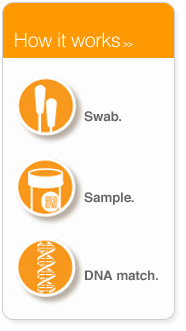Core Features of Know Error
Through the combined features described below, the know error® system identifies diagnostic mistakes due to Specimen Provenance Complications (SPCs) (specimen switching and contamination errors) which when left undetected can lead to erroneous therapy and adverse patient outcomes.
Unique Patient Identification Bar Code
Each biopsy kit features a unique patient identification bar code specific to that kit. Patient information, the test requisition and all kit components can be identified with this unique code, which helps reduce Specimen Provenance Complications (SPCs) that can occur during the collection, handling and processing of the biopsy tissues.
Forensic Chain of Custody Principles
The know error® system incorporates the forensic chain of custody principles, used in law enforcement and criminal investigations, providing a strict means of control and documentation for the handling of samples.
DNA Specimen Provenance Assay (DSPA) Testing
Through the use of microsatellite DNA analysis, DNA Specimen Provenance Assay (DSPA) testing compares the DNA profile of the patient’s self-identified buccal swab to the DNA profile of the cancerous biopsy tissue sample to identify diagnostic mistakes due to SPCs, ruling out specimen contamination and confirming the cancer diagnosis is ascribed to the correct patient.
Detailed DSPA Report
Once the DNA test is complete, an electronic report (compatible with most EMR systems) is issued to summarize the findings. The turn-around-time (TAT) varies depending upon the specimen type, but reports are usually issued within 2 – 3 days after receipt of both the tissue and reference samples. If a potential non-match is indicated, the appropriate parties are notified immediately to address the issue.






